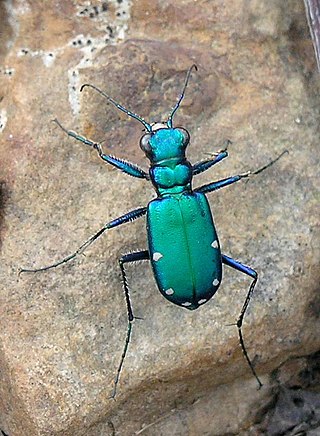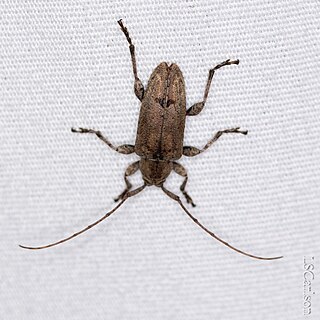
The six-spotted tiger beetle, also known as the six-spotted green tiger beetle, is a common North American species of tiger beetle in the Cicindelinae subfamily. It is common in many areas of the states, and is well known. It is recognized for its bright green color and its flight pattern. The beetle is largely harmless to humans and may live as long as three years.

Cicindela, commonly known as common tiger beetles, are generally brightly colored and metallic beetles, often with some sort of patterning of ivory or cream-colored markings. They are most abundant and diverse in habitats very often near bodies of water with sandy or occasionally clay soils; they can be found along rivers, sea and lake shores, sand dunes, around dry lakebeds, on clay banks, or woodland paths.
A macula is a spot on the retina of the human eye.

Anthia sexguttata, the six-spot ground beetle, is a beetle of the Family Carabidae.

Valencienna sexguttata, the chalk goby, sixspot goby, sleeper blue dot goby, is a species of goby native to the Indian Ocean and the western Pacific Ocean. It inhabits bays or lagoons in waters of from 3 to 25 metres with silt or sand substrates with larger pieces of rock under which to burrow. This species can reach a length of 14 centimetres (5.5 in) TL. It can also be found in the aquarium trade.
Pseudacanthoneura is a genus of tephritid or fruit flies in the family Tephritidae.There are two known species that got recognizes:

Hesperilla is a genus of skipper butterflies in the family Hesperiidae, found throughout most of Australia.

Hesperilla sexguttata, also known as the riverine sedge-skipper or six-spot skipper, is a species of butterfly in the family Hesperiidae. It is found in Australia in the Northern Territory, Queensland and Western Australia.

Astylopsis is a genus of longhorn beetles of the subfamily Lamiinae. It was described by Casey in 1913.

Astylopsis arcuata is a species of longhorn beetle of the subfamily Lamiinae. It was described by John Lawrence LeConte in 1878.

Astylopsis collaris is a species of longhorn beetles of the subfamily Lamiinae. It was described by Haldeman in 1847.

Astylopsis macula is a species of longhorn beetles of the subfamily Lamiinae. It was described by Say in 1826.

Astylopsis perplexa is a species of longhorn beetles of the subfamily Lamiinae. It was described by Haldeman in 1847.

Anoplodera is a genus of beetle in the family Cerambycidae and tribe Lepturini.
Mordella sexguttata is a species of beetle in the genus Mordella of the family Mordellidae, which is part of the superfamily Tenebrionoidea. It was discovered in 1896.
Spiloconis is a genus of lacewing.
Phostria sexguttata is a species of moth in the family Crambidae. It was described by William Jacob Holland in 1920. It is found in the Democratic Republic of the Congo.
Sybra sexguttata is a species of beetle in the family Cerambycidae. It was described by Breuning in 1939.
Glenea sexguttata is a species of beetle in the family Cerambycidae. It was described by Per Olof Christopher Aurivillius in 1925 and is known from Borneo.

Talsi rolling hills is a nature park in the middle of Talsi Municipality. It is located in the north-western part of Vanemas pauguraine and includes the highest part, administratively belongs to Laidzes, Laucienes and Lībagu parishes. The protected area was established in 1987 to protect one of the North Kurzeme Uplands and highest part of the Elder Hill. It is most diverse areas in terms of natural conditions in the Latvia north-east, with a distinctly hilly terrain and several small but deep lakes. Scenic area. Natura 2000 territory. Many Latvia rare and protected plant and animal species. In total 24 species of flora (1) and fauna (23) are protected under EU Nature directives.












